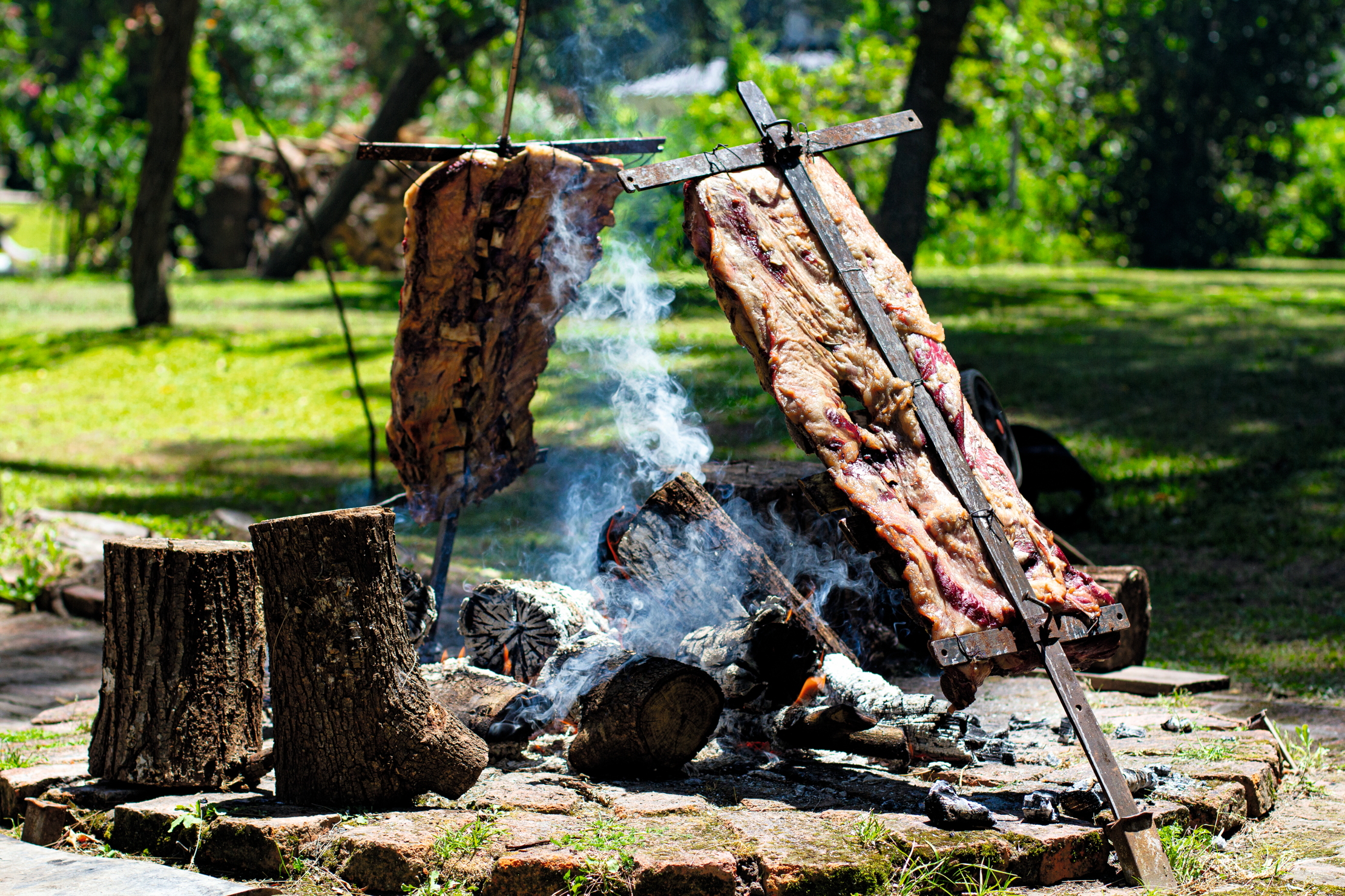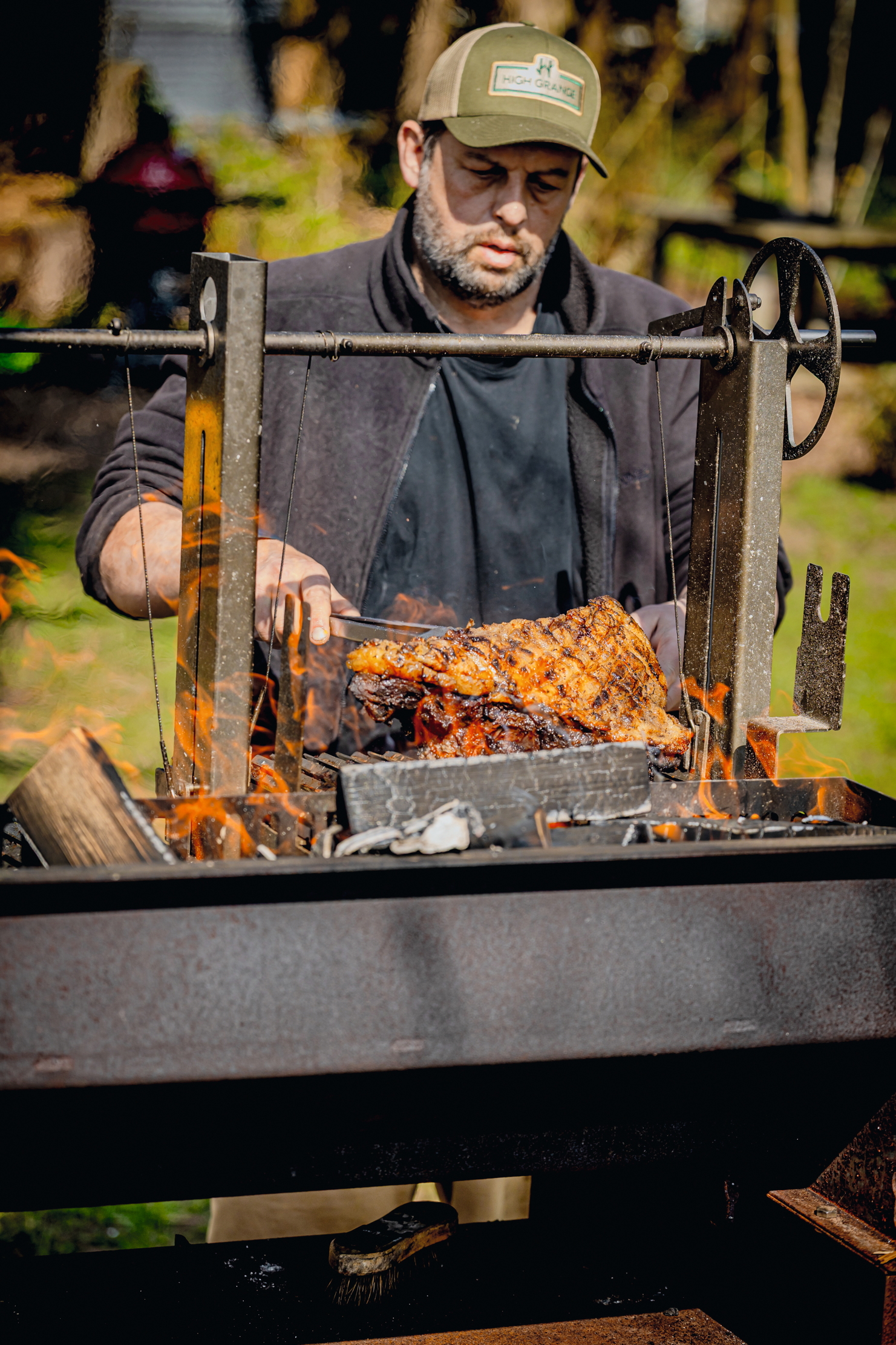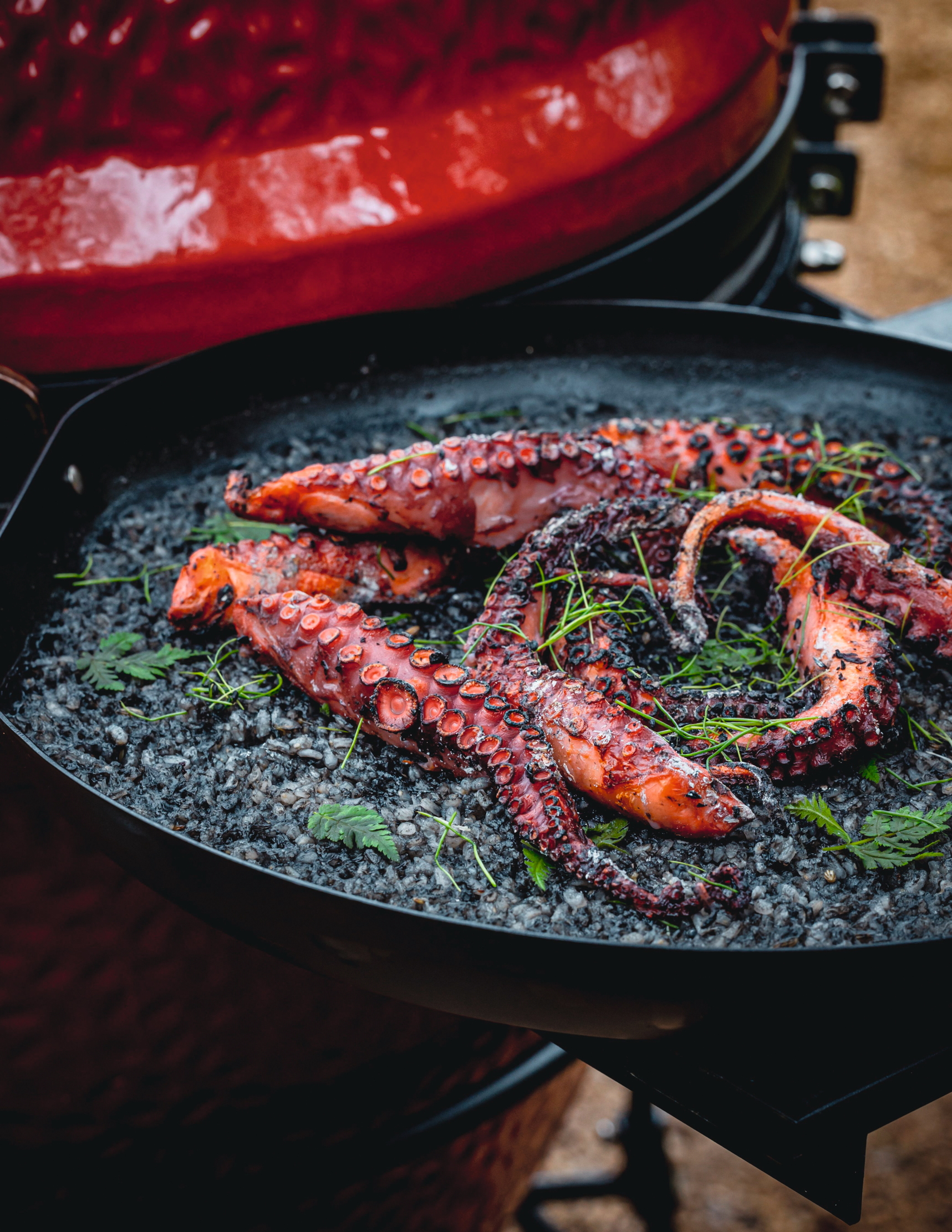'You have to commit, due to the time it takes, but it’s worth it. The flavour is unbeatable': Slow down, and barbecue better
Going back to ‘fire school’ to learn how to barbecue better might conjure images of scorched sausages cooked over a fast and furious heat. However, as Paula Minchin discovers, long and slow is best.


Exquisite houses, the beauty of Nature, and how to get the most from your life, straight to your inbox.
You are now subscribed
Your newsletter sign-up was successful
'Never use charcoal briquettes. They are the chicken nuggets of the barbecue world — they contain accelerants and chemicals that will taint your food,’ cautions chef and flame-grill expert Luke Vandore-Mackay of the fuel many of us will burn to cook charred offerings over outdoors this summer. ‘What we want is the glowing embers of a wood fire that have burned down to almost nothing.’
Luke is speaking to a group of rapt pupils, all of whom have travelled to High Grange, Devon, his BBQ HQ set in just under three acres in the Blackdown Hills near Dalwood, to attend an Asado Fire Day. We would study the ancient Argentinian way of roasting meat, fish and vegetables on an open fire, which takes time and patience.
‘The whole point is that you do it slowly and that it does not need to be all manly and masculine,’ Luke says. ‘Some barbecue schools are all about blokes, beards and beer. We’re more genteel and tend to teach a 60:40 ratio of men to women.’
First up, we needed to know how to light and maintain the right kind of fire, a lesson he defers to his assistant, Meg Robinson, who is also a forest-school teacher. It’s clear that she’s well versed in the art of conjuring flames without the aid of a match, using anything from fungus to fatwood, a resin found in pine trees. Her preferred method, however, is to use char cloth (a small piece of material, often old denim, which has been placed in an old tobacco tin with a hole in it and briefly ‘charred’ over a high heat). Soon, with a spark from a pocket-sized fire striker, Meg is building a fine fire within a stone circle on the ground with teeny pieces of kindling.
As the flames begin to lick the logs (beech and oak are good, as they burn hot and long), Luke sets about preparing a whole butterflied lamb, sourced from nearby Kilmington. It rests before him on a gargantuan wooden table hewn from a slice of a fallen tree and set on two pieces of its trunk. As he works, he tells us how the fire school came about.

Vulcan reborn, with more tenderness: Luke Vandore-Mackay reveals the secrets of roasting with the Somerset grill, patiently nurturing fat and flames for peak flavour
It turns out that he — a chef and former wine merchant, who founded the Brompton Food Market in London SW7 — and his wife, Sara, a privacy lawyer, made the move to the West Country three years ago in the hope of finding a more relaxed way of life for their three children (Murdo, 11, Sula, 8, and Skye, 6). Now, with labradors lolling in the shade of the trees and the chickens pecking by our feet, they look to have forged a piece of bucolic culinary heaven in East Devon.
After one of the group helps to affix the lamb’s legs with wire to an Asado metal cross, forged by Somerset-based Fire Made, which makes it look as if it is being crucified, it’s carefully propped up at a 45-degree angle over the fire. It is tied, with a piece of twine, to a bench behind it and left to cook languorously from 10am until 5pm. Next, our tutor rips some herbs (in this case, the curry plant, Helichrysum italicum) from the many beds laid out around his purpose-built outdoor cooking area and forms them into a makeshift brush that he dunks into a saline brine called ‘salumera’, which is flicked over the lamb at regular intervals throughout the day. ‘You want the heat and smoke to wash over it, so that it gets caught and cooks beautifully.’
Exquisite houses, the beauty of Nature, and how to get the most from your life, straight to your inbox.
'You need to devote a day to working with the wind and the fire — there’s a lot of love and time sitting around watching the fire'
From the convivial benches around the fire, we note that, although the flames have died down, the skin of the lamb is already starting to blister due to searing heat emanating from the glowing cinders. ‘One of the nice things about Asado is that you have to tend to your fire all day,’ Luke says. ‘You need to devote a day to working with the wind and the fire — there’s a lot of love and time sitting around watching the fire.’
For Luke, cooking like this is what makes us human. ‘The smoke and the flames brushing lightly and slowly against the meat means it stays tender,’ he explains. ‘The more smoke, the better — so whatever you’re cooking is constantly bathed in it.’
Once the lamb is gently roasting over the fire, we move under the roofed, open-sided kitchen area, studded with bright-red Kamado Joe ceramic barbecues (on which Mr Vandore-Mackay also offers specialist courses). We huddle around the Vulcanus Grill he describes as being more like a sculpture than a barbecue. A delicious breakfast of eggs, peppers, tomatoes and chorizo is sizzling on the plancha, a heated metal plate; he predicts cooking with one will be the next big thing. ‘The Vulcanus is one of my favourite bits of kit,’ he enthuses. ‘It’s so powerful, solid and sociable — everyone gravitates to it — and you can pretty much do everything on it, from plancha cooking to grilling, rotisserie and cooking directly on the embers.’

Now seems like a good time to admit that, before today, I’d never heard of Asado. ‘It is relatively niche — 10 years ago, no one knew much about it,’ says Luke. ‘It’s a really sociable, laid-back way of barbecuing. You have to commit, due to the time it takes, but it’s worth it. The flavour is unbeatable.’
The other attractive aspect of Asado is that you don’t need a great deal of gear: ‘I’m cooking the lamb over a fire on the ground.’ This easy-going South American approach avoids the typically British barbecue fare of chicken undercooked and dangerously pink on the inside, but burnt on the outside. Rather, after six hours, our lamb was lightly smoked and incredibly juicy, with crispy, almost glass-like skin. ‘It doesn’t matter if lunch or dinner is a bit late — you can relax and have another drink and chat with family or friends, safe in the knowledge that you cannot ruin the food,’ Luke adds. ‘The secret to a really good barbecue is to do few ingredients and do them really well,’ he adds. ‘If you’re cooking a lovely cut, such as a rib of beef — which can hang on a hook and chain above the fire for hours — let it rest, then serve it with some Jersey Royal new potatoes dripping in butter and chives, a soft English lettuce and some homemade mayonnaise — so simple, so great.’
Don’t forget, of course, that mouthwatering barbecue food is about being patient and not rushing. That and never, ever buying another bag of charcoal briquettes.
This feature originally appeared in the August 6, 2025, issue of Country Life. Click here for more information on how to subscribe
An experienced journalist, Paula Minchin, Country Life's Managing & Features Editor, has worked for the magazine for 10 years — during which time she’s overseen two special issues guest-edited by His Majesty The King in 2013 and in 2018, and the bestselling 2022 edition masterminded by his wife, Queen Camilla. A gamekeeper’s daughter, Paula began her career as a crime reporter on The Sidmouth Herald in Devon, before becoming Pony Club & Young Rider Editor, then Racing Editor, at Horse & Hound. Paula lives in Somerset with her two working Labradors, Nimrod and Rocky.
